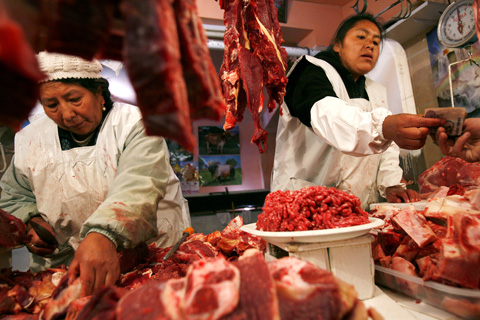Bolivia has created a new Cabinet-level ministry to defend the country from legal battles sparked by Bolivian President Evo Morales’ drive to nationalize key sectors of the economy.
To be led by Hector Arce, a 37-year-old lawyer and former government coordination minister, the new agency will back state efforts to reclaim control of petroleum, mining, telecommunications and other companies that were privatized during the 1990s, Morales said late on Thursday.
Details on the ministry’s powers and responsibilities were not immediately available, but it appears set to lead often testy takeover talks with foreign companies, now handled by the foreign ministry.

PHOTO: AP
Morales has sought control of many privatized industries, boosting state ownership of Bolivia’s oil and gas sector in 2006 — a so-called “nationalization” that grabbed headlines but allowed most foreign companies to continue operations.
This year he fully nationalized several natural gas producers and logistics companies, including subsidiaries of the Spanish company Repsol YPF and British Petroleum. He nationalized Bolivia’s few railroads last year.
Some companies have threatened to challenge the takeovers in international court, prompting Bolivia to withdraw last year from a World Bank tribunal that hears disputes between governments and foreign businesses. The court’s rulings are often biased, Bolivian officials said.
But still pending before the tribunal is an arbitration request from Italy’s Euro Telecom International, which is disputing Bolivia’s move to nationalize its subsidiary, Entel. The company was Bolivia’s state telephone company until it was privatized in 1995.
Swiss mining company Glencore International has also disputed Morales’ nationalization of a Bolivian tin smelter last year, citing an investment treaty between the two countries.
The case will likely be resolved in ongoing talks over two other Glencore mines, said a mining ministry official who spoke on condition of anonymity because he was not authorized to discuss the talks.
At the urging of the World Bank and IMF, Bolivia underwent sweeping privatizations in the mid-1990s, selling state-owned oil and gas, water, power, railroad and telecommunications companies, along with the national airline and state pension plan.
But the policy’s mixed results largely failed to spur the economic growth the international creditors had hoped for, instead prompting the anti-privatization sentiments that drive Morales’ economic policies.

Intel Corp chief executive officer Lip-Bu Tan (陳立武) is expected to meet with Taiwanese suppliers next month in conjunction with the opening of the Computex Taipei trade show, supply chain sources said on Monday. The visit, the first for Tan to Taiwan since assuming his new post last month, would be aimed at enhancing Intel’s ties with suppliers in Taiwan as he attempts to help turn around the struggling US chipmaker, the sources said. Tan is to hold a banquet to celebrate Intel’s 40-year presence in Taiwan before Computex opens on May 20 and invite dozens of Taiwanese suppliers to exchange views

Application-specific integrated circuit designer Faraday Technology Corp (智原) yesterday said that although revenue this quarter would decline 30 percent from last quarter, it retained its full-year forecast of revenue growth of 100 percent. The company attributed the quarterly drop to a slowdown in customers’ production of chips using Faraday’s advanced packaging technology. The company is still confident about its revenue growth this year, given its strong “design-win” — or the projects it won to help customers design their chips, Faraday president Steve Wang (王國雍) told an online earnings conference. “The design-win this year is better than we expected. We believe we will win

Chizuko Kimura has become the first female sushi chef in the world to win a Michelin star, fulfilling a promise she made to her dying husband to continue his legacy. The 54-year-old Japanese chef regained the Michelin star her late husband, Shunei Kimura, won three years ago for their Sushi Shunei restaurant in Paris. For Shunei Kimura, the star was a dream come true. However, the joy was short-lived. He died from cancer just three months later in June 2022. He was 65. The following year, the restaurant in the heart of Montmartre lost its star rating. Chizuko Kimura insisted that the new star is still down

While China’s leaders use their economic and political might to fight US President Donald Trump’s trade war “to the end,” its army of social media soldiers are embarking on a more humorous campaign online. Trump’s tariff blitz has seen Washington and Beijing impose eye-watering duties on imports from the other, fanning a standoff between the economic superpowers that has sparked global recession fears and sent markets into a tailspin. Trump says his policy is a response to years of being “ripped off” by other countries and aims to bring manufacturing to the US, forcing companies to employ US workers. However, China’s online warriors